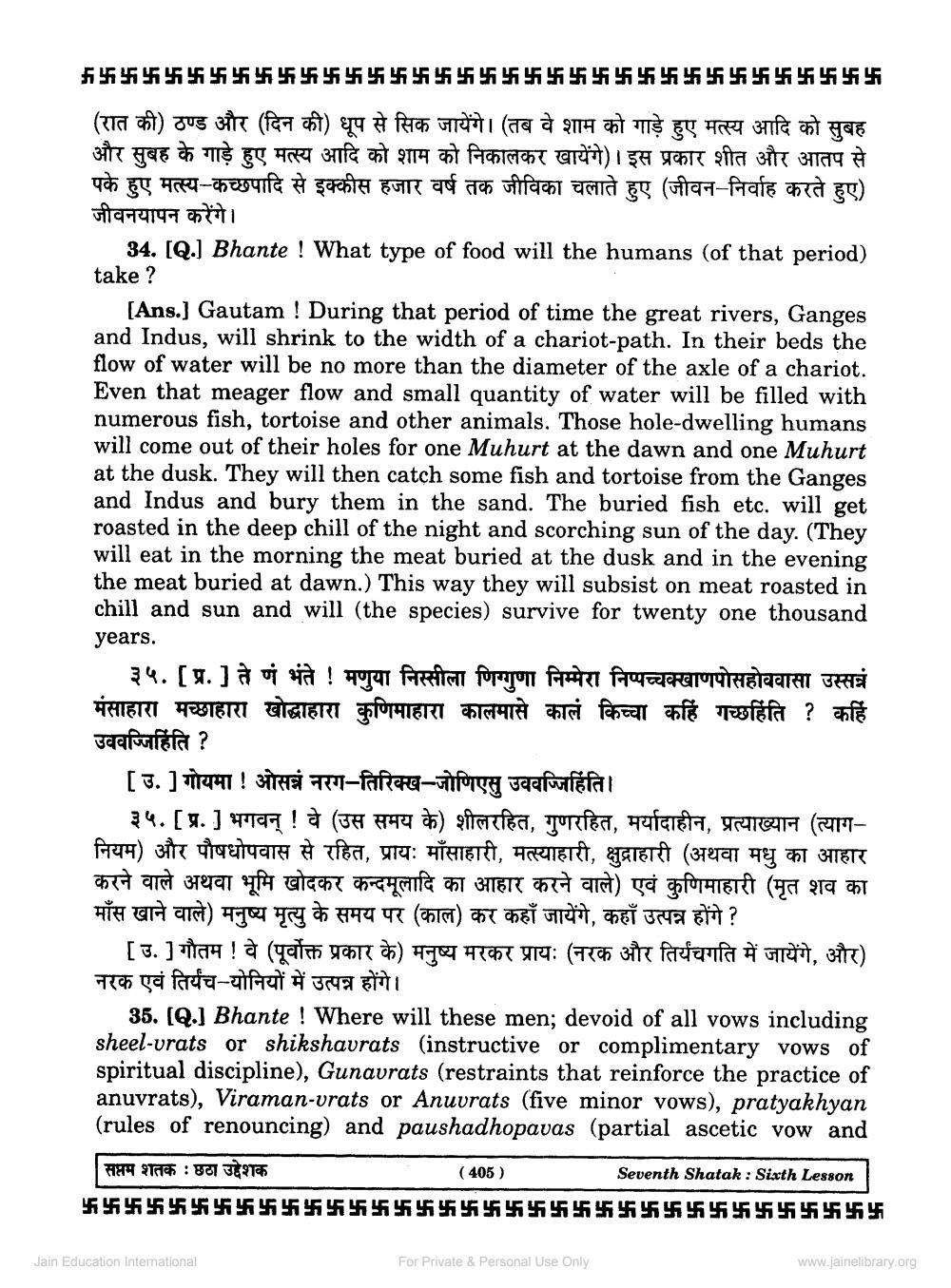________________
फ्र
( रात की) ठण्ड और (दिन की ) धूप से सिक जायेंगे। (तब वे शाम को गाड़े हुए मत्स्य आदि को सुबह और सुबह के गाड़े हुए मत्स्य आदि को शाम को निकालकर खायेंगे)। इस प्रकार शीत और आतप से पके हुए मत्स्य - कच्छपादि से इक्कीस हजार वर्ष तक जीविका चलाते हुए (जीवन - निर्वाह करते हुए) जीवनयापन करेंगे।
34. [Q.] Bhante ! What type of food will the humans (of that period) take?
[Ans.] Gautam ! During that period of time the great rivers, Ganges and Indus, will shrink to the width of a chariot-path. In their beds the flow of water will be no more than the diameter of the axle of a chariot. Even that meager flow and small quantity of water will be filled with numerous fish, tortoise and other animals. Those hole-dwelling humans will come out of their holes for one Muhurt at the dawn and one Muhurt at the dusk. They will then catch some fish and tortoise from the Ganges and Indus and bury them in the sand. The buried fish etc. will get roasted in the deep chill of the night and scorching sun of the day. (They will eat in the morning the meat buried at the dusk and in the evening the meat buried at dawn.) This way they will subsist on meat roasted in chill and sun and will (the species) survive for twenty one thousand
years.
३५. [ प्र. ] ते णं भंते ! मणुया निस्सीला णिग्गुणा निम्मेरा निप्पच्चक्खाणपोसहोववासा उस्सन्नं साहारा मच्छाहारा खोद्धाहारा कुणिमाहारा कालमासे कालं किच्चा कहिं गच्छहिंति ? कहिं उववज्जिहिंति ?
[उ.] गोयमा ! ओसन्नं नरग-तिरिक्ख - जोणिएसु उववज्जिर्हिति ।
३५. [ प्र. ] भगवन् ! वे ( उस समय के) शीलरहित, गुणरहित, मर्यादाहीन, प्रत्याख्यान (त्यागनियम) और पौषधोपवास से रहित, प्रायः माँसाहारी, मत्स्याहारी, क्षुद्राहारी ( अथवा मधु का आहार करने वाले अथवा भूमि खोदकर कन्दमूलादि का आहार करने वाले) एवं कुणिमाहारी ( मृत शव का माँस खाने वाले) मनुष्य मृत्यु के समय पर (काल) कर कहाँ जायेंगे, कहाँ उत्पन्न होंगे ?
[ उ. ] गौतम ! वे (पूर्वोक्त प्रकार के) मनुष्य मरकर प्रायः (नरक और तिर्यंचगति में जायेंगे, और ) नरक एवं तिर्यंच-योनियों में उत्पन्न होंगे।
35. [Q.] Bhante ! Where will these men ; devoid of all vows including sheel-vrats or shikshavrats (instructive or complimentary vows of spiritual discipline), Gunavrats (restraints that reinforce the practice of anuvrats), Viraman-vrats or Anuvrats (five minor vows), pratyakhyan (rules of renouncing) and paushadhopavas (partial ascetic vow and सप्तम शतक छठा उद्देशक
Seventh Shatak: Sixth Lesson
Jain Education International
(405)
For Private & Personal Use Only
फ्र
www.jainelibrary.org




